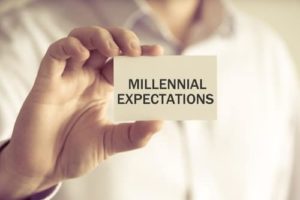Millennial Expectations: Learning to Live with Healthcare's New Consumerism
Poke around online briefly and this prediction appears. It heralds the need for doctors to change and accept healthcare consumerism:
“The medical world expects ‘patients’ to bear up patiently.
But the medical world needs to learn to live with ‘consumers.’”
 What’s most surprising is that this quote is more than three decades old. It’s from an Abstract about health cost-management tests from the mid-1980’s. The transformation from patients to consumers and the trend toward healthcare consumerism has moved at a glacial pace…until recently.
What’s most surprising is that this quote is more than three decades old. It’s from an Abstract about health cost-management tests from the mid-1980’s. The transformation from patients to consumers and the trend toward healthcare consumerism has moved at a glacial pace…until recently.
During the past dozen years the Internet, the ACA and societal shifts have begun to accelerate the process. Health conscious and medically informed individuals have emerged. The people previously known as “patients” have become the vanguard of health and medical consumers.
The industry’s delivery systems continue to change (ever-so-slowly) from physician-centered to a patient-centered model. It’s not the same old compliant-patient audience. Patients no longer “bear up patiently.”
Consumerism includes previously unheard-of buyer expectations. To be effective, contemporary marketing needs to know how to redefine the care and systems for the audiences it serves. Here are some of the retail-like attitudes that are reshaping the “medical world’s need to live with consumers.”
Access and convenience lead healthcare consumerism demands…
A sobering reminder emerges in primary care. Consumers would consider using other venues including retail clinics (56 percent) and consider using email [online] visits (42 percent), according to a consumer choice survey (Advisory Board, 2014).
Even more revealing is the finding that consumers prioritize access and convenience over provider continuity or credentials. Respondents would most prefer a service location that’s near to home, but online/email visits were preferred over a clinic location near to errands or near work.
Regarding loyalty to a primary care office, the survey found that “cost, not a medical error, is the top reason respondents would switch PCPs.” Additionally, “manners beat credentials. Current patients care more about how they are treated than by whom. Respondents were significantly more likely to consider a PCP switch after facing rude staff than different staff.”
Convenience is the new currency…
The largest living consumer cohort is now the Millennials—roughly 18 to 34 years of age—now larger than the Baby Boomer crowd. Millennials have come of age with the computer and Internet world and their expectations seem to follow. They rely heavily on digital methods, they expect service to be quick and convenient, and they are likely to be the most demanding audience. Did I mention “convenient” is the overarching watchword?
Millennials expect (demand) that services be nearby and available (nearly) on-demand…with a minimum of delay or waiting. Nearly 75 percent of this group expedient processes and sees the Internet is a means to manage healthcare appointments, review medical results and to pay bills online. (Harris Poll for Salesforce, 2015)
Digital means and methods are cited throughout the healthcare experience from the decision process starting line. Millennials:
- Like and often use social networks for reviews and comments
- Consult blogs and online resources (30 percent) for health information
- Crave authoritative and helpful facts and particulars above info that “sells”
- Respect honesty and transparency in research and information
And, significantly, more than 75 percent of this group cited online reviews from other patients as a criterion for selecting a healthcare provider.
Consumerism is here to stay…
It’s been a slow transition, but there’s no indication that the American healthcare delivery system is likely to return to a provider-centric business model. Not everyone is comfortable with the patient-centered shift, but as the retail world knows from experience, it’s good business to put the customer—and their service expectations—at the focal point of successful service.
Watch for additional installments in this series, with a look at the needs, interests and demands of Baby Boomers, Seniors and other important audience groups.
See how Healthcare Success transforms doctor marketing by generating exposure and increasing qualified leads!








